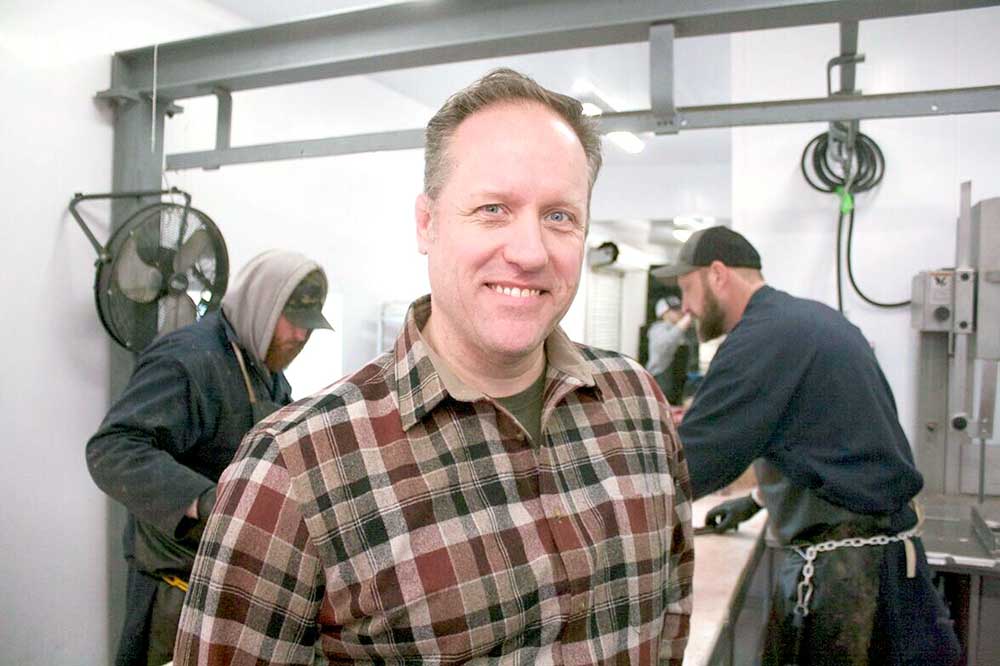It’s time to recruit a new generation of butchers
Published 11:30 am Thursday, March 9, 2023

- Northwest Meat Processor Association Troy Wilcox, seen here in a meat-cutting shop in Onalaska, oversees the association’s apprenticeship program, an effort to recruit a new generation of butchers.
CHEHALIS — Troy Wilcox, executive director of the Northwest Meat Processors Association, has a mission: recruit people to become butchers.
There are about 375 butcher shops in Washington, Oregon and Idaho. Many butchers are in their 70s and some have retired and closed shop without finding anyone to take over, he said.
“We have an aging workforce, and we don’t have people coming behind them,” Wilcox said. “It is a problem coming to a head right now.”
Wilcox, 49, is not a butcher. He is wholesale sales manager for Lynch Creek Farm, a Shelton company that sells Christmas decor, such as wreaths. Previously, he represented a company that supplies packaging materials to butcher shops.
He joined the meat-cutters board to represent suppliers. After switching jobs, he stayed on the board to oversee the meat-cutters apprenticeship program, started in 2019. “I really like the meat processors as a group of people,” he said.
When Walla Walla butcher Jerry Haun stepped down last year as director of the meat-cutters association, Wilcox agreed to take the part-time position.
“It couldn’t be anybody better,” Haun said. “He’s a people person — a great organizer and communicator.”
The U.S. Bureau of Labor Statistics projects 17,700 openings for butchers every year for the next decade. The trade hasn’t attracted enough people to keep up with the demand for meat-cutters, Haun said.
To train a new generation of butchers, the Northwest meat-cutters association created a three-year apprenticeship in the three states
“It’s been a slow-go starting out, but we’re excited about it,” Haun said.
Apprentices must be at least 18 years old and have a high school or GED diploma.
Working under a butcher, apprentices learn the trade — from inspecting and slaughtering livestock to breaking down carcasses to smoking and curing meat.
One person has completed an apprenticeship. Three apprentices — two in Idaho and one in Oregon — are in training. Wilcox said the program can take more, “a hundred easily.”
A survey last year by the Washington State Department of Agriculture confirmed finding workers is a pressing problem for meat-cutters.
The department received 54 responses. Some shops are USDA-inspected and sell meat to retailers. Most are custom shops that butcher meat for consumption by the animal’s owner.
Finding trained employees was “extremely challenging,” according to 38 respondents. Another 10 said it was “very challenging.”
Half said even finding untrained employees was “extremely” or “very” challenging.
Meat-cutting shops reported they were busy. Some 38 said demand for their services was “much more than their capacity” during peak seasons.
Staffing was the most commonly cited reason shops couldn’t take on more business. “The demand is going to grow. … if we can find ways to train people,” one meat-cutter commented.
“Training meat-cutters is the hardest. It takes time and money to create a good one that gets the finesse and hustle,” another remarked.
Wilcox said a challenge to recruiting apprentices — besides the problem of publicizing the program — is that young workers can initially make more money elsewhere.
Hourly wages for apprentice butchers vary slightly by region. Western Washington apprentices start at $16.75. Regular pay raises follow as the apprentice accumulates hours. The apprentice graduates as a journeyman butcher paid $25 an hour.
“We have a lot of young people, say 19, 20 years old, who get a construction job at $20 an hour, life’s great, but they’re not getting raises,” Wilcox said. “For someone future-minded, I think we have a better program than that.
“We’re going to teach you a valuable, highly sought skill you can take anywhere in the country,” he said. “I just don’t know any journeyman butcher who has trouble finding work.
“I think the demand for what we do is there. A lot of people want to know where their meat comes from,” Wilcox said.
Age: 49
Position: Northwest Meat Processors Association executive director
Job: Wholesale sales manager, Lynch Creek Farm, Shelton, Wash.
Education: Attended Liberty University, Lynchburg, Va.; Highline Community College, Des Moines, Wash.; Lynden, Wash., High School
Family: Wife, Angela; four children, ages 16, 14, 13, 11





